外研版七年级上册 Module 5 Unit 2 We start work at nine o'clock.课件 (共42张PPT)
文档属性
| 名称 | 外研版七年级上册 Module 5 Unit 2 We start work at nine o'clock.课件 (共42张PPT) | 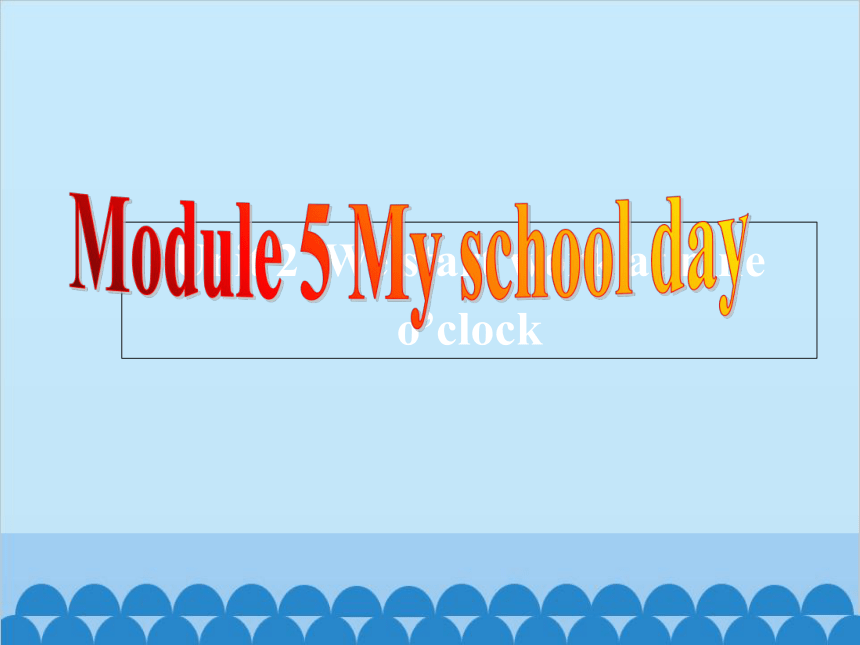 | |
| 格式 | ppt | ||
| 文件大小 | 4.0MB | ||
| 资源类型 | 教案 | ||
| 版本资源 | 外研版 | ||
| 科目 | 英语 | ||
| 更新时间 | 2022-10-10 13:19:24 | ||
图片预览


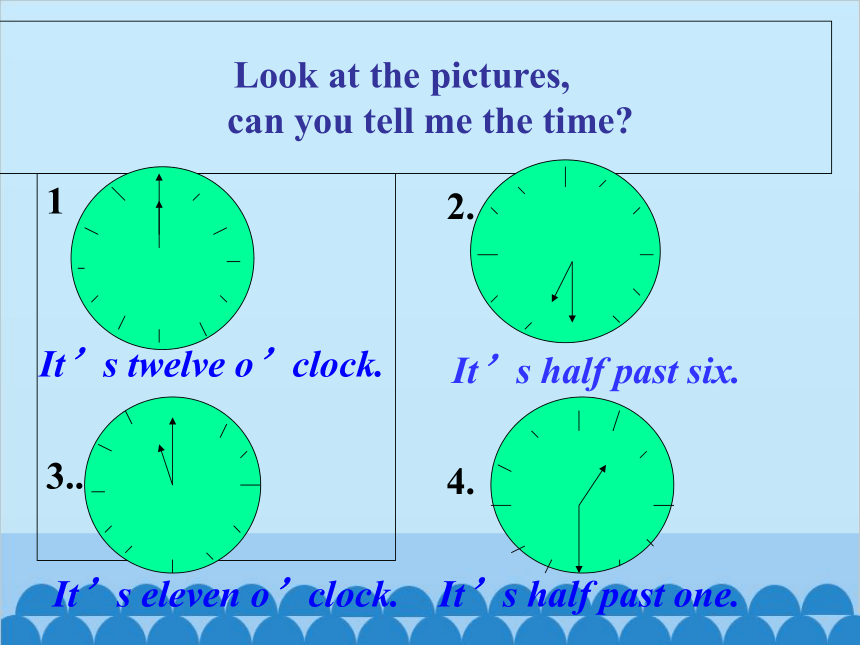
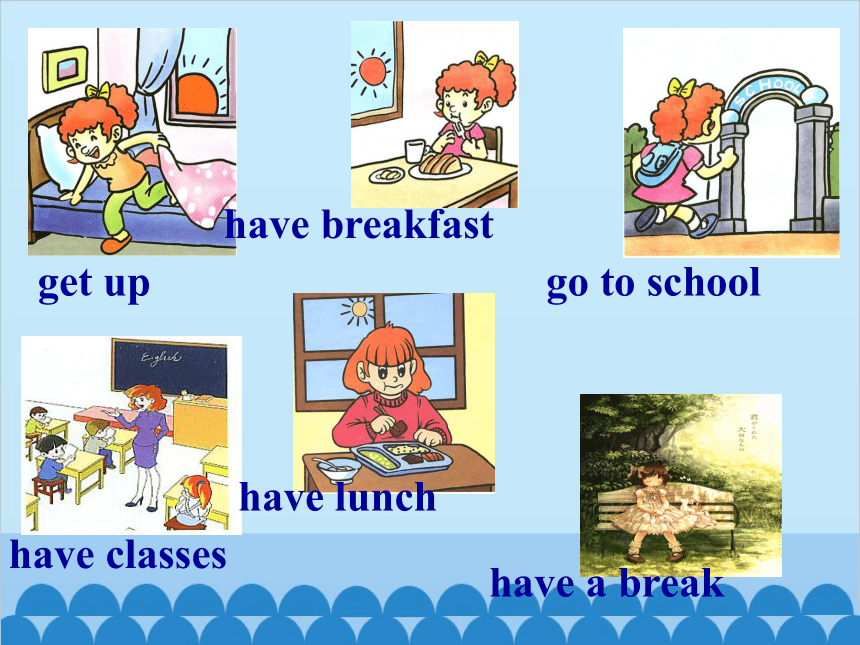
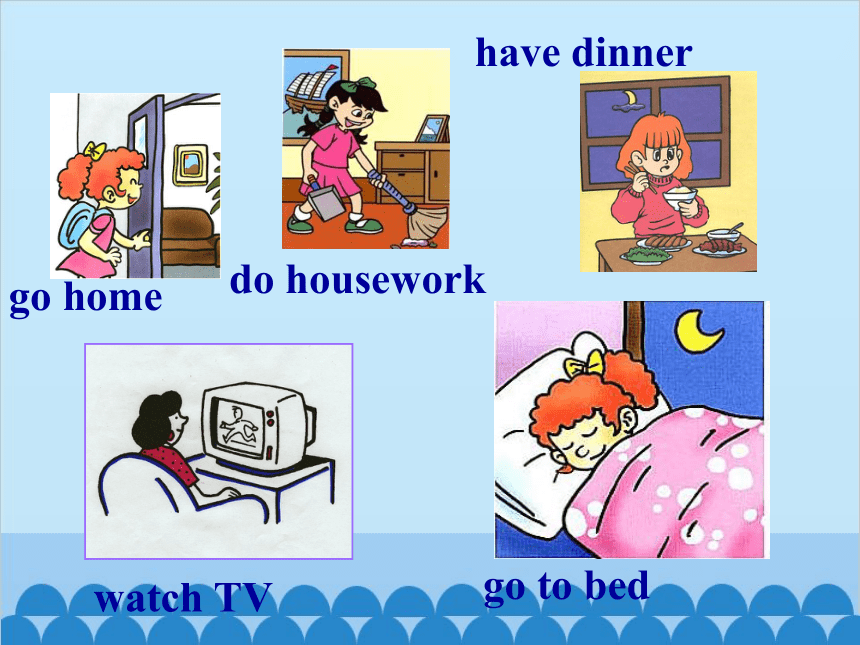


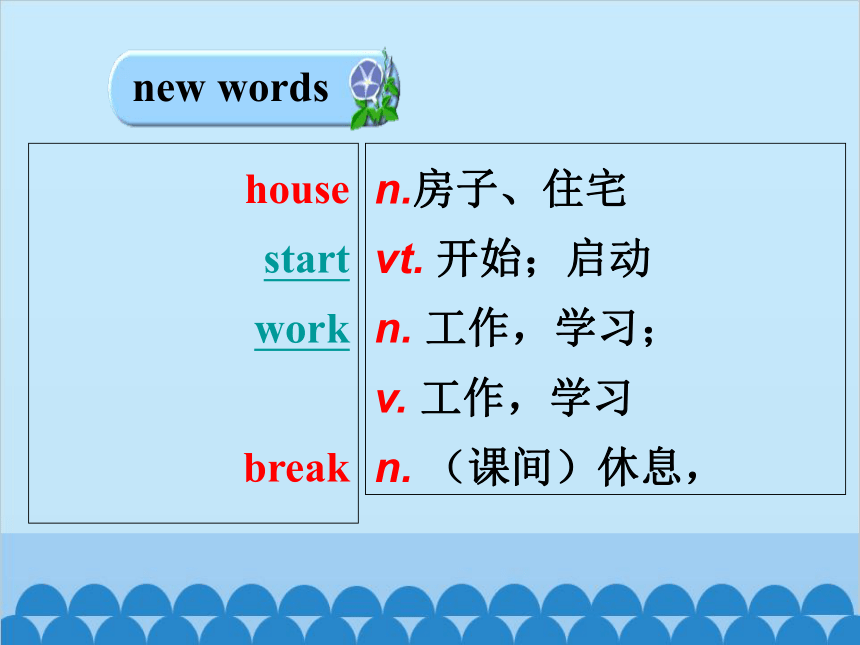
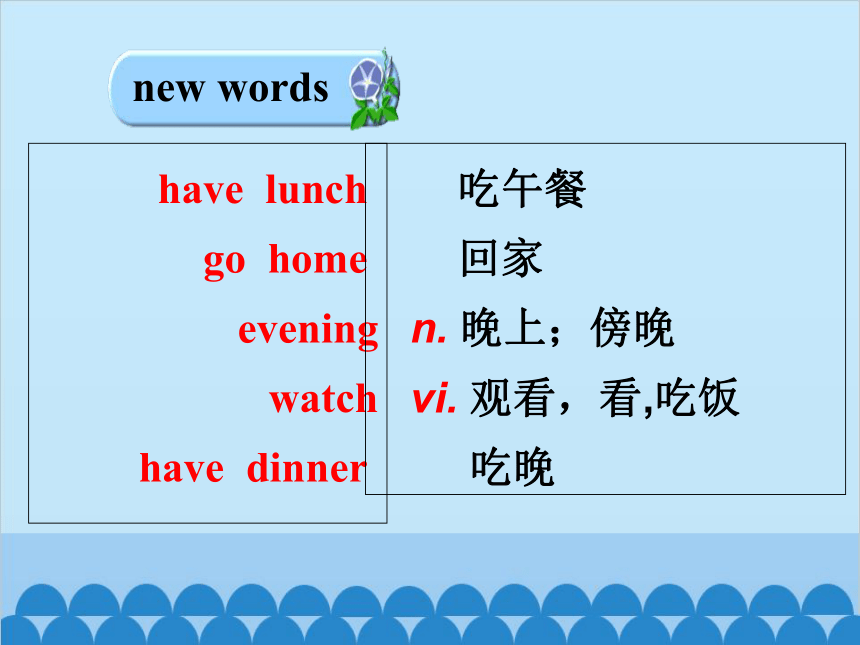
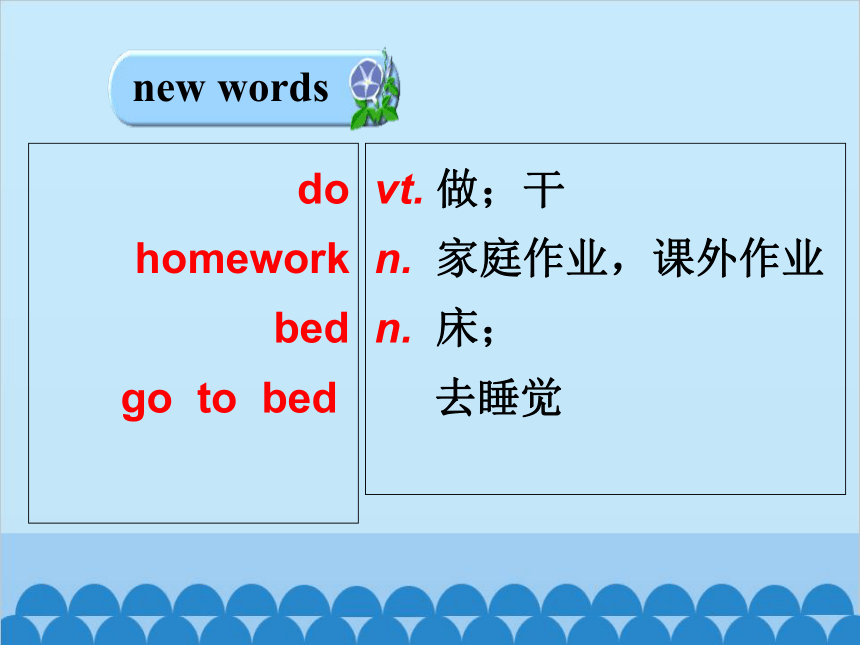
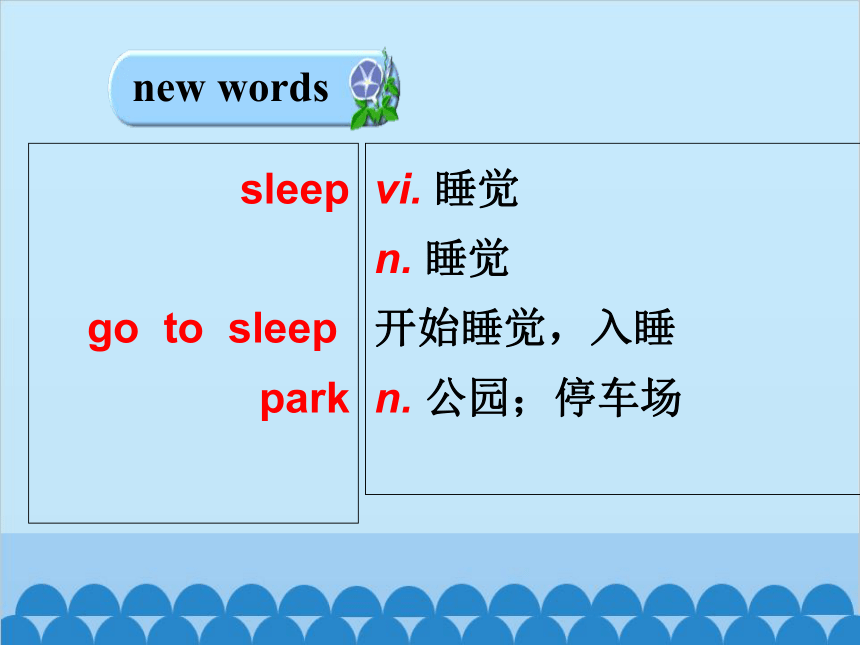
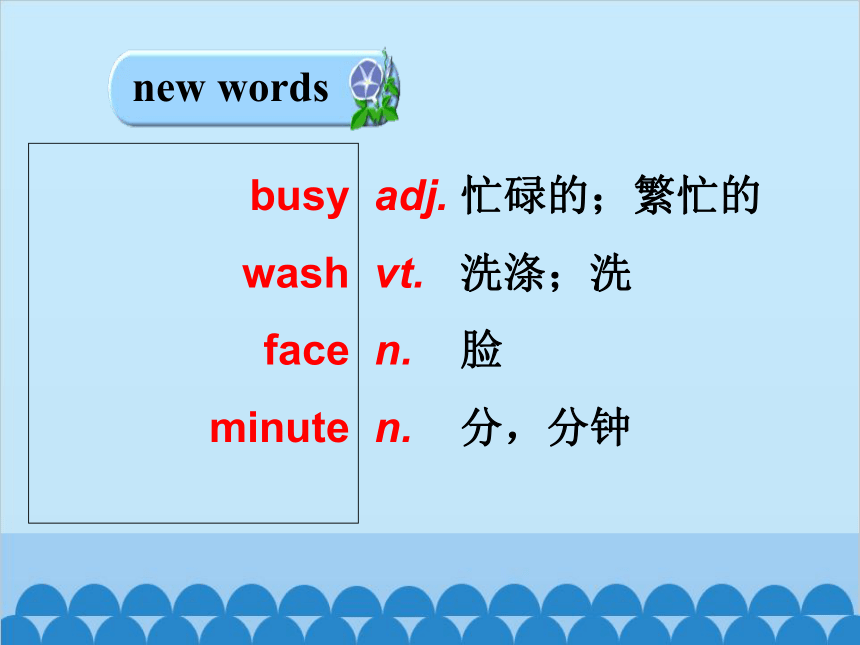
文档简介
(共42张PPT)
Unit 2 We start work at nine o’clock
课前延伸
Are you ready
Let's go!
Look at the pictures,
can you tell me the time
1
3..
2.
4.
It’s twelve o’clock.
It’s half past six.
It’s eleven o’clock.
It’s half past one.
get up
have breakfast
go to school
have classes
have lunch
have a break
watch TV
go to bed
have dinner
do housework
go home
Review
Read the words and expressions loudly.
go to school
weekday
get up
have breakfast
上学
n. 平日,工作日
起床
吃早餐
new words
house
start
work
break
n.房子、住宅
vt. 开始;启动
n. 工作,学习;
v. 工作,学习
n. (课间)休息,
new words
have lunch
go home
evening
watch
have dinner
吃午餐
回家
n. 晚上;傍晚
vi. 观看,看,吃饭
吃晚
new words
do
homework
bed
go to bed
vt. 做;干
n. 家庭作业,课外作业
n. 床;
去睡觉
new words
sleep
go to sleep
park
vi. 睡觉
n. 睡觉
开始睡觉,入睡
n. 公园;停车场
new words
busy
wash
face
minute
adj. 忙碌的;繁忙的
vt. 洗涤;洗
n. 脸
n. 分,分钟
new words
3. start v.开始
【拓展】(近)begin
back
4. work v.学习;工作
n.学习;工作
back
1. Read the passage and put the picture in order .
My school day
Hi ! I’m Alex Greenall . I’m thirteen and I go to Park School in Oxford, England. I go to school on weekdays, but not on Saturday and Sunday. This is my school day. I get up at half past seven in the morning, and then have breakfast.
My school is next to my house. I go to school at half past eight and see my friends. We start work at nine o'clock. We have three lessons in the morning. My favourite subject is art.
At eleven o'clock, we have a break in the playground and I talk to my friends. They go to the playground and play football but I don't like football
We have lunch in the dining hall at half past twelve.I like school lunch! We have meat and rice with vegetables, or hamburgers. I drink juice or water.
We start lessons in the afternoon at half past one. We have two lessons in the afternoon. Then we go home at half past three.
In the evening, I watch TV and have dinner with my family. I do my homework and go to bed at ten o’clock.
2. Match the times with the pictures in Activity 1.
7:30 am ____ 10:00 pm ____
11:00 am ____ 12:30 pm ____ 3:30 pm ____ 9:00 am ____
c
d
b
a
e
f
f
e
d
c
b
a
1 I get up / start work at half past seven.
2 We have a break / have lunch at half past twelve.
3 I go home / watch TV in the evening.
4 I do my homework / see my friends in the evening.
5 I go home / go to sleep at ten o’clock.
Activity 3-Underline the correct expressions.
1.Write some sentences about yourself.
I get up at…
.
Work in pairs. Talk about your school day.
I get up at half past seven.
We start work at nine o’clock.
We have lunch at half past twelve.
5
A: What time do you get up everyday
B: I get up at half past seven.
A: What time do you start work
B: We start work at nine o’clock.
A: What time do you have lunch
B: We have lunch at half past twelve.
1. I get up at seven o’clock. I go to school at eight o’clock.
I get up at seven o’clock, and then go to school at eight o’clock.
6 Look at the sentences:
Now join these sentences with and then.
1. In the morning, we get up. We go to school.
2. In the afternoon, we have lessons. We play football in the playground.
In the morning, we get up, and then go to school.
In the afternoon, we have lessons, and then we play football in the playground.
3. In the evening, I have dinner. I do my homework.
4. In the evening, I do my homework. I go to bed.
I the evening, I have dinner, and then do my homework.
In the evening, I do my homework, and then go to bed.
语法聚焦
行为动词的一般现在时(一)
主语是I, we, you, they或名词复数时,行为动词一般疑问句的构成及其回答:
— Do+主语+行为动词+其它?
— Yes,主语+do./ No,主语+don’t.
— Do you have a pen 你有一只钢笔吗?
— Yes,I do./No,I don’t.是的,我有。/不,我没有。
行为动词的一般现在时(二)
用法∶
(1)表经常性或习惯性的动作。
I go to bed at 10∶00.我十点钟上床睡觉。
(2)也可用来表示现在的状态。
I like English very much.我很喜欢英语。
语法聚焦
1. I’m thirteen and I go to Park School in Oxford, England.我13岁,在英国牛津的帕克中学上学。
在同一句子中,经常将小地点放在前面,大地点放在后面。
He is from New York, America.
他来自美国纽约。
back
2. I get up at half past seven in the morning, and then have breakfast.我早上7∶30起床,然后吃早饭。
(1)get up意为“起床”,对应短语go to bed,意为“上床睡觉”。
back
(2)have breakfast意为“吃早饭”,have作动词,表“吃;喝”。have...for breakfast早饭吃……
(3)and then...接着;然后……
We have dinner , and then watch TV.我们吃晚饭,然后看电视。
3. We start work at nine o’clock.
我们九点开始学习。
(1)start意为“开始”。
①不及物动词
Our first class starts at nine.我们第一节课九点开
back
②及物动词
start sth./ doing sth./ to do sth. 开始做某事
I start to have lunch at 12∶00.
= I start having lunch at 12∶00.我十二点开始吃午饭。
(2)work作不可数名词,表“工作,学习”,work还作动词,表“工作,学习”。
I have a lot of work to do.我有许多工作要做。
They work hard.他们工作/学习很努力。
1.Then we go home at half past three.我们三点半回家。
home作副词时,意为“到家;向家,在家”,前面不用介词。
back
Let’s go home.(√)
Let’s go to home.(×)
我们回家吧!
They get home at seven.他们七点到家。
2. In the evening, I watch TV and have dinner with my family.晚上我和家人一起看电视,吃晚饭。
with的用法∶
back
(1)作介词,意为“和,同,与……一起”。
I go to school with my brother.我和哥哥一起上学。
(2)作介词,意为“具有(品质/特征),带有”。
China is a large country with a long history.中国是一个有着悠久历史的大国。
3. On Friday I have a busy day.
星期五我很忙。
busy是形容词,意为“繁忙的”。
be busy with sth.忙于(做)某事
be busy doing sth.忙于做某事
back
Unit 2 We start work at nine o’clock
课前延伸
Are you ready
Let's go!
Look at the pictures,
can you tell me the time
1
3..
2.
4.
It’s twelve o’clock.
It’s half past six.
It’s eleven o’clock.
It’s half past one.
get up
have breakfast
go to school
have classes
have lunch
have a break
watch TV
go to bed
have dinner
do housework
go home
Review
Read the words and expressions loudly.
go to school
weekday
get up
have breakfast
上学
n. 平日,工作日
起床
吃早餐
new words
house
start
work
break
n.房子、住宅
vt. 开始;启动
n. 工作,学习;
v. 工作,学习
n. (课间)休息,
new words
have lunch
go home
evening
watch
have dinner
吃午餐
回家
n. 晚上;傍晚
vi. 观看,看,吃饭
吃晚
new words
do
homework
bed
go to bed
vt. 做;干
n. 家庭作业,课外作业
n. 床;
去睡觉
new words
sleep
go to sleep
park
vi. 睡觉
n. 睡觉
开始睡觉,入睡
n. 公园;停车场
new words
busy
wash
face
minute
adj. 忙碌的;繁忙的
vt. 洗涤;洗
n. 脸
n. 分,分钟
new words
3. start v.开始
【拓展】(近)begin
back
4. work v.学习;工作
n.学习;工作
back
1. Read the passage and put the picture in order .
My school day
Hi ! I’m Alex Greenall . I’m thirteen and I go to Park School in Oxford, England. I go to school on weekdays, but not on Saturday and Sunday. This is my school day. I get up at half past seven in the morning, and then have breakfast.
My school is next to my house. I go to school at half past eight and see my friends. We start work at nine o'clock. We have three lessons in the morning. My favourite subject is art.
At eleven o'clock, we have a break in the playground and I talk to my friends. They go to the playground and play football but I don't like football
We have lunch in the dining hall at half past twelve.I like school lunch! We have meat and rice with vegetables, or hamburgers. I drink juice or water.
We start lessons in the afternoon at half past one. We have two lessons in the afternoon. Then we go home at half past three.
In the evening, I watch TV and have dinner with my family. I do my homework and go to bed at ten o’clock.
2. Match the times with the pictures in Activity 1.
7:30 am ____ 10:00 pm ____
11:00 am ____ 12:30 pm ____ 3:30 pm ____ 9:00 am ____
c
d
b
a
e
f
f
e
d
c
b
a
1 I get up / start work at half past seven.
2 We have a break / have lunch at half past twelve.
3 I go home / watch TV in the evening.
4 I do my homework / see my friends in the evening.
5 I go home / go to sleep at ten o’clock.
Activity 3-Underline the correct expressions.
1.Write some sentences about yourself.
I get up at…
.
Work in pairs. Talk about your school day.
I get up at half past seven.
We start work at nine o’clock.
We have lunch at half past twelve.
5
A: What time do you get up everyday
B: I get up at half past seven.
A: What time do you start work
B: We start work at nine o’clock.
A: What time do you have lunch
B: We have lunch at half past twelve.
1. I get up at seven o’clock. I go to school at eight o’clock.
I get up at seven o’clock, and then go to school at eight o’clock.
6 Look at the sentences:
Now join these sentences with and then.
1. In the morning, we get up. We go to school.
2. In the afternoon, we have lessons. We play football in the playground.
In the morning, we get up, and then go to school.
In the afternoon, we have lessons, and then we play football in the playground.
3. In the evening, I have dinner. I do my homework.
4. In the evening, I do my homework. I go to bed.
I the evening, I have dinner, and then do my homework.
In the evening, I do my homework, and then go to bed.
语法聚焦
行为动词的一般现在时(一)
主语是I, we, you, they或名词复数时,行为动词一般疑问句的构成及其回答:
— Do+主语+行为动词+其它?
— Yes,主语+do./ No,主语+don’t.
— Do you have a pen 你有一只钢笔吗?
— Yes,I do./No,I don’t.是的,我有。/不,我没有。
行为动词的一般现在时(二)
用法∶
(1)表经常性或习惯性的动作。
I go to bed at 10∶00.我十点钟上床睡觉。
(2)也可用来表示现在的状态。
I like English very much.我很喜欢英语。
语法聚焦
1. I’m thirteen and I go to Park School in Oxford, England.我13岁,在英国牛津的帕克中学上学。
在同一句子中,经常将小地点放在前面,大地点放在后面。
He is from New York, America.
他来自美国纽约。
back
2. I get up at half past seven in the morning, and then have breakfast.我早上7∶30起床,然后吃早饭。
(1)get up意为“起床”,对应短语go to bed,意为“上床睡觉”。
back
(2)have breakfast意为“吃早饭”,have作动词,表“吃;喝”。have...for breakfast早饭吃……
(3)and then...接着;然后……
We have dinner , and then watch TV.我们吃晚饭,然后看电视。
3. We start work at nine o’clock.
我们九点开始学习。
(1)start意为“开始”。
①不及物动词
Our first class starts at nine.我们第一节课九点开
back
②及物动词
start sth./ doing sth./ to do sth. 开始做某事
I start to have lunch at 12∶00.
= I start having lunch at 12∶00.我十二点开始吃午饭。
(2)work作不可数名词,表“工作,学习”,work还作动词,表“工作,学习”。
I have a lot of work to do.我有许多工作要做。
They work hard.他们工作/学习很努力。
1.Then we go home at half past three.我们三点半回家。
home作副词时,意为“到家;向家,在家”,前面不用介词。
back
Let’s go home.(√)
Let’s go to home.(×)
我们回家吧!
They get home at seven.他们七点到家。
2. In the evening, I watch TV and have dinner with my family.晚上我和家人一起看电视,吃晚饭。
with的用法∶
back
(1)作介词,意为“和,同,与……一起”。
I go to school with my brother.我和哥哥一起上学。
(2)作介词,意为“具有(品质/特征),带有”。
China is a large country with a long history.中国是一个有着悠久历史的大国。
3. On Friday I have a busy day.
星期五我很忙。
busy是形容词,意为“繁忙的”。
be busy with sth.忙于(做)某事
be busy doing sth.忙于做某事
back
同课章节目录
- Starte
- Module 1 My teacher and my friends
- Module 2 My English lesson
- Module 3 My English book
- Module 4 My everyday life
- Module 1 My classmates
- Unit 1 Nice to meet you.
- Unit 2 I'm Wang Lingling and I'm thirteen years ol
- Unit 3 Language in use.
- Module 2 My family
- Unit 1 Is this your mum?
- Unit 2 These are my parents.
- Unit 3 Language in use.
- Module 3 My school
- Unit 1 There are thirty students in my class.
- Unit 2 The library is on the left of the playgroun
- Unit 3 Language in use.
- Module 4 Healthy food
- Unit 1 We've got lots of apples.
- Unit 2 Is your food and drink healthy?
- Unit 3 Language in use.
- Module 5 My school day
- Unit 1 I love history.
- Unit 2 We start work at nine o'clock.
- Unit 3 Language in use.
- Revision module A
- Module 6 A trip to the zoo
- Unit 1 Does it eat meat?
- Unit 2 The tiger lives in Asia.
- Unit 3 Language in use.
- Module 7 Computers
- Unit 1 How do I write my homework on the computer?
- Unit 2 When do you use a computer?
- Unit 3 Language in use.
- Module 8 Choosing presents
- Unit 1 I always like birthday parties.
- Unit 2 She often goes to concerts.
- Unit 3 Language in use.
- Module 9 People and places
- Unit 1 We're enjoying the school trip a lot.
- Unit 2 They're waiting for buses or trains.
- Unit 3 Language in use.
- Module 10 Spring Festival
- Unit 1 Are you getting ready for Spring Festival?
- Unit 2 My mother's cleaning our houses and sweepin
- Unit 3 Language in use.
- Revision module B
